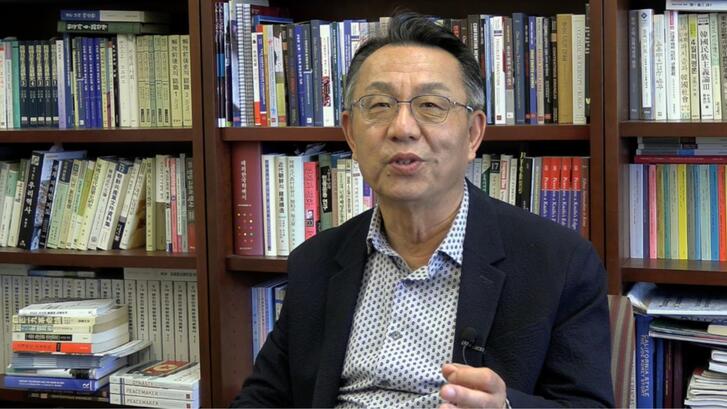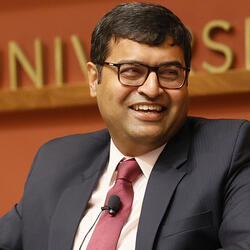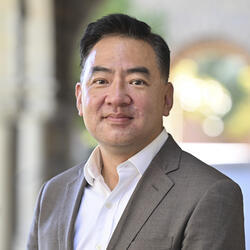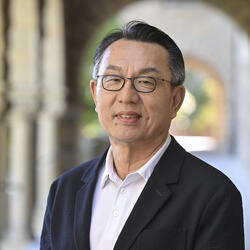Stanford Next Asia Policy Lab Probes Political Messaging and Public Attitudes in U.S.-China Rivalry
As the U.S.-China competition unfolds in areas ranging from trade to technology to the military, the rival-making discourse surrounding this great power competition was the focus of the conference Beyond a New Cold War, organized and hosted by the Stanford Next Asia Policy Lab (SNAPL).
Held on August 14, 2025, the event showcased SNAPL research illuminating how U.S. political leaders and the media shape narratives concerning China and how citizens in young democracies perceive these narratives. Serving as discussants were experts from Columbia University, the University of California, Berkeley, the Hoover Institution (represented by a former National Security Affairs Fellow), and the U.S. Congressional-Executive Commission on China.
The studies presented and discussed at the conference are part of SNAPL’s U.S.-Asia Relations research track, one of four research streams the lab pursues. Housed at the Shorenstein Asia-Pacific Research Center (APARC) and founded by sociologist Gi-Wook Shin, the lab aims to generate evidence-based policy recommendations and promote transnational collaboration with academic and policy institutions to advance the future prosperity of Asia and U.S.-Asia relations.
“This conference provided an excellent opportunity to engage the policy community with our research findings,” says Shin, the William J. Perry Professor of Contemporary Korea, a senior fellow at the Freeman Spogli Institute for International Studies (FSI), and the director of APARC and the Korea Program. “The lab will continue to foster ongoing dialogue between academic and policy circles.”
The conference builds on previous SNAPL forums and meetings with policy and academic communities in Washington, D.C., held in September 2024. These policy engagement activities are made possible thanks to a grant from FSI.
Sign up for APARC newsletters to receive our experts' updates >
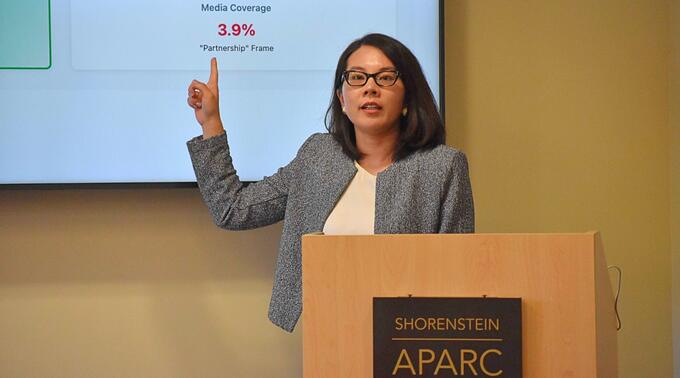
Dynamics of American Elite Discourse on China
At the first conference panel, Research Fellow Xinru Ma shared a study that unravels who leads elite discourse on U.S.-China relations – whether Congress, the White House, or the media. While prior research suggests that each of these actors could have distinct agenda-setting capacities, their relative influence and its directionality in foreign policy discourse remain empirically underexamined.
The study addresses this question by investigating China-focused discourse and framing by the U.S. legislative and executive branches as well as the media. Using computational and causal inference methods, the study analyzes social media data from the legislative and executive branches alongside major U.S. media outlets across two periods: the 116th Congress (January 3, 2019 – January 3, 2021) and the 118th Congress (January 3, 2023 – January 3, 2025).
The analysis reveals that, both in terms of issue attention and framing, the media tends to follow the lead of Congress and the President. The findings also indicate that Republican lawmakers exert greater influence on setting the China agenda in the media. In contrast, Democratic lawmakers are stronger predictors of how the media frames the issues at stake. Moreover, the findings suggest that presidential influence on China discourse weakened sharply in the 118th Congress, and that there is an overall shift toward party-driven, rather than institutionally mediated, communication among elites.
Policy Implications
- Media Weakness: The reliance of media outlets on partisan cues from political elites on foreign policy issues increases the risk of incomplete or skewed public understanding of China and U.S.-China relations. The risk is especially disconcerting as U.S. reporters face limited access to China.
- Partisan Echo Chambers: Communication flows primarily within partisan networks rather than across institutions, with the separation of powers becoming less effective as a system of checks and balances. The splintering of political discourse into parallel echo chambers risks eroding opportunities for cross-party dialogue and democratic deliberation on complex foreign policy issues.
- Fragmented Messaging: Divergent partisan messaging on China signals inconsistency to both domestic and international audiences who might draw contradictory conclusions about U.S. intentions. This dynamic gives rise to strategic miscalculations abroad and a fragmented public understanding of China policy at home.
- Declining Institutional Voices: The decline of institutional power over shaping U.S. discourse on China has created a growing vulnerability. As individual political figures gain sway, personalized narratives often prioritize short-term visibility over a coherent, long-term strategy.
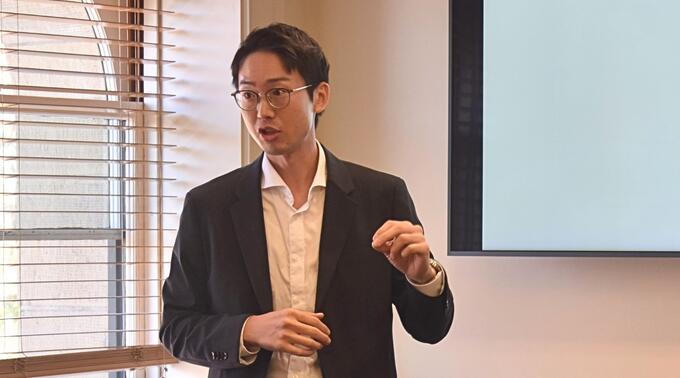
Democracy vs. Autocracy: A View from Young Democracies
Despite their deep divisions on most issues, there is one topic Republicans and Democrats converge on: China. Both parties increasingly frame the intensifying U.S.-China tensions as a strategic competition between democracy and autocracy. But is the value diplomacy this approach begets effective in promoting liberal values in young democracies?
At the second conference panel, Visiting Scholar Gidong Kim presented a study that addresses this question. “This study challenges the effectiveness of the value-laden U.S. diplomacy in young democracies and presents a more nuanced explanation of democracy's role in forming public opinion on foreign policy,” says Kim, formerly a postdoctoral fellow with SNAPL and currently an assistant professor of political science at Hankuk University of Foreign Studies (HUFS).
The study hypothesizes that in young democracies, where democratic histories are relatively short and legacies of authoritarian rule endure, citizens tend to understand democracy in terms of electoral institutions rather than liberal values. Similarly, in the context of the U.S.-China competition, citizens in these countries tend to perceive China’s threats to electoral institutions more seriously than its threats to liberal values.
To test this proposition, the study uses a country-level, cross-national analysis and an original survey experiment in South Korea. The findings support the hypothesis.
Policy Implications
- Context Matters: U.S. policymakers must acknowledge the limits of value-driven diplomacy. Washington should diversify its foreign policy toolkit and adapt it to regional contexts: in Western Europe, liberal values rhetoric can reinforce alliances, but in young democracies, the design and strength of electoral institutions carry greater weight.
- A Crisis of Credibility: For China, there is an equally clear lesson about the need to rethink its approach to diplomacy. Without addressing suspicions of election interference in democratic countries, Beijing will struggle to gain traction with the publics in young Asian democracies and dissipate anti-China sentiments in those countries, even if it increases its soft power through liberalization policies.
SNAPL’s studies presented at the conference underscore the crucial role that narratives and public perceptions play in international relations. They suggest that great power competition is not just about power. Rather, it is also about persuasion, which, in turn, depends on how different audiences — at home and abroad — perceive the story.
Read More
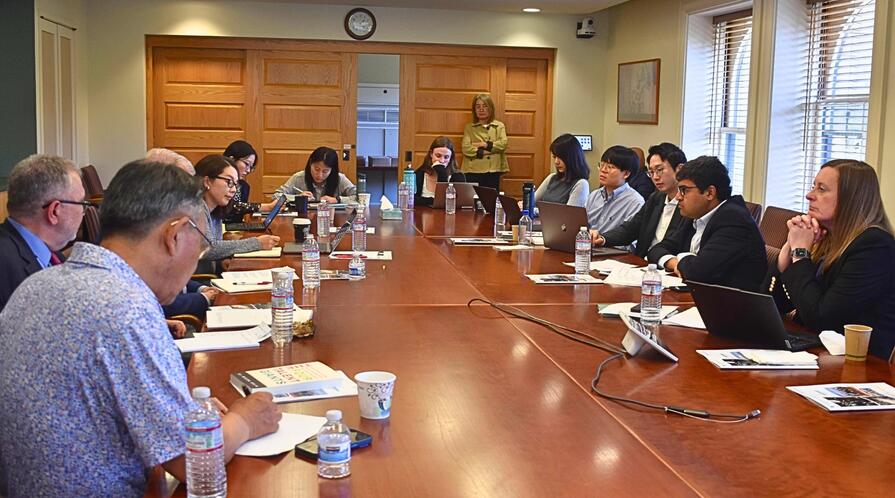
At a recent conference, lab members presented data-driven, policy-relevant insights into rival-making in U.S.-China relations.

 FSI researchers strive to understand how countries relate to one another, and what policies are needed to achieve global stability and prosperity. International relations experts focus on the challenging U.S.-Russian relationship, the alliance between the U.S. and Japan and the limitations of America’s counterinsurgency strategy in Afghanistan.
FSI researchers strive to understand how countries relate to one another, and what policies are needed to achieve global stability and prosperity. International relations experts focus on the challenging U.S.-Russian relationship, the alliance between the U.S. and Japan and the limitations of America’s counterinsurgency strategy in Afghanistan.